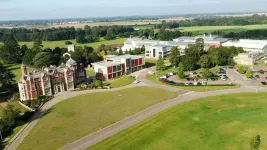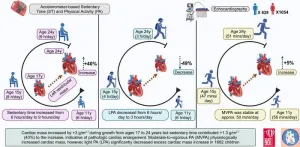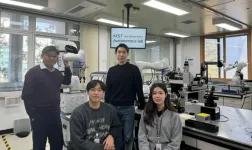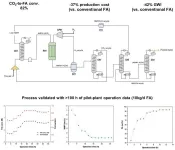(Press-News.org) Following a quinquennial review by the Biotechnology and Biological Sciences Research Council (BBSRC), the Babraham Institute will receive £48m for the period 2024-2028 to advance research on the mechanisms that maintain the health of our cells, tissues and organs across the life course.
This work is key in driving BBSRC’s strategic research priorities around an integrated understanding of health, developing and applying transformative technologies and advancing our understanding of the rules of life.
As one of eight UK bioscience institutes receiving strategic funding from BBSRC, this latest investment compliments a wider portfolio of strategically important research that will significantly enhance the UK’s capability to deliver world-leading research with socio-economic impact.
The new funding supports the Babraham Institute to undertake three strategic programmes of work: Epigenetic control across the life course, Cellular responses to stress, and Immunity, resilience and repair. All three programmes have a strong focus on the mechanisms that drive ageing and will provide new insights into age-related disease that the Institute will progress with biotech, pharma and clinicians.
The investment also includes a core grant to support essential infrastructure and capability, including the Institute’s eight cutting-edge facilities and Institute business operations. These same facilities also support early-stage bioscience companies on the Babraham Research Campus.
The Babraham Institute has been awarded £48m from BBSRC, part of UK Research and Innovation, to support its core research across epigenetics, immunology and cell signalling over the next four years. The focus of the Institute’s fundamental research is to understand biology in relation to maintaining health, especially with regards to protecting and maximising good health in the later years of life.
Older age brings many opportunities but can also be blighted by declining health and life-changing or life-limiting diseases. The trend in people living longer means they are more likely to spend some proportion of their later years in ill health. Beyond the impact on the individual, this has wider impacts on families, those with caring responsibilities, health services and society. Protecting health, maximising health span and minimising time spent in ill health as we age is at the heart of our purpose.
BBSRC’s investment supports three strategic programmes of work to advance our ability to protect health and counter age-related decline: Epigenetic control across the life course, Cellular responses to stress and Immunity, resilience and repair.
They will be delivered by teams of internationally recognised experts at the Institute working closely with collaborative partners across academia and industry, including other strategically supported research institutes and companies based on the Babraham Research Campus.
In addition, the funding supports the underpinning infrastructure required to deliver the research goals, including the Institute’s eight cutting-edge facilities, and also supports the Institute’s day-to-day running and activities to ensure follow-on impact through sharing and capitalising on the Institute’s research. Notably, these same facilities also support more than 50 early-stage bioscience companies on the Babraham Research Campus, one of the leading research and innovation campuses in Europe. Recent spin-out companies from the Institute such as Enhanc3D Genomics and Aila Biotech have benefited from this unique environment.
Dr Simon Cook, Babraham Institute Director, said: “We are immensely excited to initiate this new strategic programme of research. We believe that the combination of expertise brought together to achieve this work, including our researchers and technical experts, and the skills of the teams that enable our research to happen, means that we can tackle important biological questions in new ways. From understanding the earliest steps of development to ensuring that vaccines deliver strong protection to older populations, each discovery may make a difference to human health and wellbeing.”
A connected and diverse ecosystem of bioscience capabilities
The work supported by this investment forms part of the wider research portfolio undertaken by eight strategically supported bioscience institutes. As the UK’s major public funder of bioscience research and innovation, BBSRC is responsible for the long-term investment of public funds in theses institutes.
With each institute addressing specialist and complementary areas, this combined work will provide solutions to UK and global challenges such as human and animal health, nutrition, food security and sustainable agriculture. As centres for expertise in fundamental biology and innovation hubs, the institutes also contribute to maintaining the UK’s position as a leader in research and innovation.
Professor Guy Poppy, Interim Executive Chair at BBSRC, said:
“As one of BBSRC's eight strategically supported institutes, the Babraham Institute is a critical component of the national and international bioscience research and innovation ecosystem.
"Babraham is an expert in its field and this latest funding reflects BBSRC's confidence in the world-leading research undertaken at the Babraham Institute and its potential to transform our understanding of health across the whole life course.
"But we are not only investing in science that promises to unveil critical insights into the mechanisms of life. We are nurturing an ecosystem where innovation flourishes.
"The investment BBSRC is making in the Babraham Institute and its other seven strategically supported institutes over the next four years is critical. Collectively, we are driving the discovery and development of novel bio-based solutions to address some of the most pressing challenges of our times.
"From enhancing healthier life spans to fostering sustainable solutions for ageing societies, BBSRC's investment represents a significant step forward in our shared mission to harness the power of bioscience for a healthier, more resilient future.”
In addition to the Babraham Institute, BBSRC also provides strategic funding to:
Earlham Institute
Institute of Biological, Environmental and Rural Sciences (IBERS)
John Innes Centre
The Pirbright Institute
Quadram Institute
Roslin Institute
Rothamsted Research
The Babraham Institute completed the Institute Assessment Exercise in 2023, a year later than the other BBSRC-supported institutes, due to leadership changes from 2020-2022 and so will receive funding for four years until 2028.
Babraham Institute strategic research programmes for 2024-2028
Epigenetic states underpin the fidelity of gene expression and cell identity during development and throughout the life course. Once established, the resilience of epigenetic states is critical for healthy ageing. The Epigenetic control across the life course programme will define how epigenetic control is established at key stages of development and how it changes over the life course, particularly in relation to changing nutrition.
The work will be enabled by the technical capabilities provided by our Genomics, Gene Targeting, Mass Spectrometry and Imaging facilities and the AAALAC-accredited Biological Support Unit (BSU) for mice breeding and care.
Working with collaborators from the John Innes Centre, the Earlham Institute and the Francis Crick Institute, the work will set the groundwork for future therapeutic interventions to safeguard epigenetic states, mitigating adverse change and promoting resilience. Other applications of this work include stem-cell based therapies for wound treatment and improved techniques for cell reprogramming as part of regenerative medicine.
--------------------------------------------------------------------------------------------------------------------------
The Cellular responses to stress programme will focus on understanding some of the drivers of age-related functional decline. Lifelong health is critically dependent on resilience, the ability of our cells and tissues to detect, adapt and rebound from challenges, such as environmental toxins, injury and changes in diet.
The programme will identify cell signalling mechanisms that allow cells to respond to growth stimuli or cell stress or damage; these include protein quality control mechanisms (proteostasis) that clear the cells of damaged proteins that otherwise accumulate throughout the life course. Defects in these signalling processes drive ageing and age-related disease.
By combining expertise from across the Institute’s strategic programmes, utilising the Institute’s Imaging, Biological Chemistry and Mass Spectrometry facilities, and working with external collaborators including from the University of Cambridge, University of Liverpool, the ALBORADA Drug Discovery Institute, the Buck Institute (USA) and the Max Planck Institute for the Biology of Ageing (Cologne), this knowledge will identify new opportunities for therapeutic intervention to mitigate age-related physiological decline that will be progressed with biotech and pharmaceutical companies.
--------------------------------------------------------------------------------------------------------------------------
A decline in adaptive immunity is one of the most widely recognised consequences of ageing, leading to increases susceptibility to infection and disease and also decreased protection from vaccination. The Immunity, resilience and repair programme will define the molecular and cellular basis of how our immune system responds to infection and vaccination, and how this is affected by ageing. This knowledge is key to understanding how immune protection is developed and maintained, and of relevance to vaccine development, disease treatment and auto-immunity.
This work will be supported by the Institute’s facilities, utilising high-dimensional flow cytometry, cutting-edge expertise in imaging technologies and the Institute’s ageing mouse colony and will include collaborations with the NIHR BioResource, the Ageing Cluster of the MRC National Mouse Genetics Network and the GSK Immunology Network.
Promoting immunity is one of the pillars of lifelong health and one of the best interventions we have in a world at risk of losing effective antimicrobials. By providing a molecular and cellular-level understanding of how immunological memory is maintained and the orchestration of immune cell interactions and co-dependencies, this research will underpin approaches to promote immunity through vaccination and to mitigate detrimental inflammation and immune senescence.
--------------------------------------------------------------------------------------------------------------------------
Fundamental research that makes a difference
In the last funding period (2017-2024), the Institute’s fundamental research delivered:
745 research papers, many describing ground-breaking research and technological advances; these papers have received 48,000 citations.
a transient cellular reprogramming method that can rejuvenate cells without affecting cell identity (see press release).
a better understanding of the cellular process of autophagy, helping researchers accurately monitor and distinguish between distinct autophagy processes in fundamental and translational research (see news).
significant advance in our understanding of the effects of age on the immune system and how to improve vaccines and vaccination strategies to confer better protection of the older population. This work included validation of the vaccination strategy for the Oxford – AstraZeneca Covid vaccine (see news).
3 spin-outs arising from 21 patent families: Enhanc3D Genomics, Aila Biotech and Elithium Bio.
73 researchers trained to PhD level and equipped to contribute to the UK’s bioeconomy through research and innovation.
Professor Dame Linda Partridge, Chair of the Institute’s Board of Trustees, said: “This work will advance the frontiers of biology to promote lifelong health, wellbeing and the maintenance of a prosperous, productive and resilient society. The Institute possess a unique collection of capabilities and in partnership with the external academic and commercial collaborators will continue to make pioneering research discoveries that will translate to better health.”
END
Babraham Institute receives £48M strategic investment from BBSRC for a four-year programme of work to promote lifelong health
2024-05-07
ELSE PRESS RELEASES FROM THIS DATE:
Childhood sedentariness linked to premature heart damage – light physical activity reversed the risk
2024-05-07
An increase in sedentary time from childhood caused progressing heart enlargement, a new study shows. However, light physical activity could reduce the risk. The study was conducted in collaboration between the Universities of Bristol and Exeter, and the University of Eastern Finland, and the results were published in the prestigious European Journal of Preventive Cardiology.
Left ventricular hypetrophy refers to an excessive increase in heart mass and size. In adults, it is known to increase the risk for heart attacks, stroke, and premature death.
In the present study, 1,682 children ...
Parents’ watchful eye may keep young teens from trying alcohol, drugs: Study
2024-05-07
PISCATAWAY, NJ – Teenagers are less likely to drink, smoke or use drugs when their parents keep tabs on their activities--but not necessarily because kids are more likely to be punished for substance use, suggests a new study in the Journal of Studies on Alcohol and Drugs.
Researchers found that, contrary to common belief, parents’ “monitoring” does not seem to boost the odds of catching their kids using substances. However, when kids simply are aware that their parents are monitoring behavior, they avoid trying alcohol or drugs in the first place.
It is the fear of being caught, rather than actually being punished.
Many studies ...
A triumph of galaxies in three new images from the VST
2024-05-07
FOR IMMEDIATE RELEASE
Distant, far away galaxies. Interacting galaxies, whose shape has been forged by the mutual gravitational influence, but also galaxies forming groups and clusters, kept together by gravity. They are the protagonists of three new images released by the VLT Survey Telescope (VST).
VST is an optical telescope with a 2,6 diameter mirror, entirely built in Italy, that has been operating since 2011 at the European Southern Observatory’s (ESO) Paranal Observatory in Chile. Since 2022, the telescope has been fully managed by INAF through the National Coordination Centre for VST, ...
Smart labs for bespoke synthesis of nanomaterials are emerging
2024-05-07
In the early 20th century, the development of a catalyst for ammonia synthesis by the Haber-Bosch method took more than 10,000 experiments before it was successful. The development of new materials is a time-consuming and costly process from design to commercialization. However, in recent years, researchers have been working to shorten the development period by using artificial intelligence (AI). When combined with robots, it is possible to conduct material development research 24 hours a day, 365 days a year without human ...
The commercialization of CO2 utilization technology to produce formic acid is imminent
2024-05-07
CCU (Carbon Capture & Utilization), which captures CO2 and converts it into useful compounds, is crucial for rapidly transitioning to a carbon-neutral society. While CCS (Carbon Capture & Storage), which only involves CO2 storage, has entered the initial commercialization stage due to its relatively simple process and low operational costs, CCU has only been explored at the research level due to the complexity of conversion processes and high production costs of compounds.
Dr. Lee Ung's team at the Clean Energy Research Center ...
Multisite review shows serious adverse events occur frequently in outpatient care
2024-05-06
Embargoed for release until 5:00 p.m. ET on Monday 6 May 2024
Annals of Internal Medicine Tip Sheet
@Annalsofim
Below please find summaries of new articles that will be published in the next issue of Annals of Internal Medicine. The summaries are not intended to substitute for the full articles as a source of information. This information is under strict embargo and by taking it into possession, media representatives are committing to the terms of the embargo not only on their own behalf, but also on behalf of the ...
Study highlights need for improvement of patient safety in outpatient settings
2024-05-06
KEY TAKEAWAYS
In a study of outpatient sites, researchers found that 7% of patients experienced at least one adverse event and 1.9% of patients experienced at least one preventable adverse event.
The most common adverse events in the outpatient setting were adverse drug events.
The findings highlight an urgent need to develop interventions to prevent both inpatient and outpatient harm.
Over the last several decades, research has brought nationwide awareness to issues of patient harm in the “inpatient” setting, where patients ...
Sylvester researchers develop a nanoparticle that can penetrate the blood-brain barrier
2024-05-06
MIAMI, FLORIDA (EMBARGOED UNTIL MAY 6, 2024 AT 3:00 P.M. EDT) – Researchers at Sylvester Comprehensive Cancer Center at the University of Miami Miller School of Medicine have developed a nanoparticle that can penetrate the blood-brain barrier. Their goal is to kill primary breast cancer tumors and brain metastases in one treatment, and their research shows the method can shrink breast and brain tumors in laboratory studies.
Brain metastases, as these secondary tumors are called, most commonly arise from solid tumors like breast, lung and colon cancer and are often associated with a poor prognosis. When cancer breaches ...
Caterbot? Robatapillar? It crawls with ease through loops and bends
2024-05-06
Engineers at Princeton and North Carolina State University have combined ancient paperfolding and modern materials science to create a soft robot that bends and twists through mazes with ease.
Soft robots can be challenging to guide because steering equipment often increases the robot’s rigidity and cuts its flexibility. The new design overcomes those problems by building the steering system directly into the robot’s body, said Tuo Zhao, a postdoctoral researcher at Princeton.
In an article published May 6 in the journal PNAS, the researchers describe how they created the robot out ...
Geologists, biologists unearth the atomic fingerprints of cancer
2024-05-06
Scientists at the University of Colorado Boulder and Princeton University have, for the first time, employed a tool often used in geology to detect the atomic fingerprints of cancer.
In a case of medicine meets earth science, the researchers discovered that cancer cells may be made from a different assortment of hydrogen atoms than healthy tissue. The findings could give doctors new strategies for studying how cancer grows and spreads—and may even, one day, lead to new ways to spot cancer early on in the body.
The team, led by CU Boulder geochemist Ashley Maloney, will publish its findings this week ...









